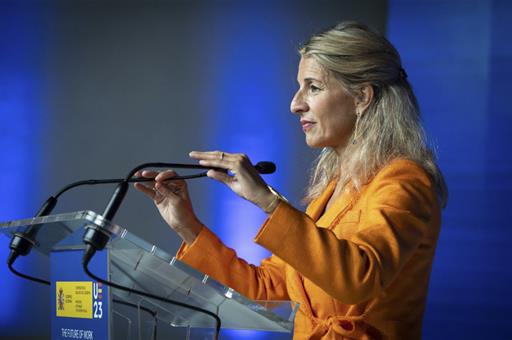Yolanda Díaz urges EU to encourage democracy at work, regulate artificial intelligence and introduce green collective bargaining
News - 2023.9.22
The second Deputy Prime Minister and acting minister for Work and Social Economy, Yolanda Díaz, has urged the European Union to advance democracy at work, to create a legal framework to regulate the impact of algorithms and artificial intelligence in the world of work, as well as to include green collective bargaining.
The minister made these statements in Santiago de Compostela, where, in the framework of the Spanish Presidency of the Council of the European Union she has called an international meeting to analyse 'The future of work and social dialogue'. This event brought together more than a hundred people, including European authorities, European social partners, international organisations and experts.
"The European Union, I am convinced, can and should be a global benchmark in human, climate, labour and social rights", said the minister at the end of the meeting, and called for a Union that is "a model of feminist and labour rights, that promotes a new paradigm of social and gender justice".
Democratisation at work
In her first speech of the day, the minister advocated extending democracy in the workplace, following other successful experiences in European countries such as Germany and Sweden, among others. "When people have the possibility to participate in decisions that affect them, productivity, innovation and work organisation improve, as well as well-being and working conditions," she argued.
The Commissioner for Jobs and Social Rights, Nicolas Schmit, has expressed his support for this Spanish proposal, advocating that it be taken up by the Commission.
Díaz has proposed updating the 20-year-old Directive on information and consultation of workers in the EU and the Directive on European Works Councils for transnational companies. The world of work has changed a lot since then and, in her opinion, boards should be opened up to working people not for ideological reasons, but for the economic and social efficiency of the measure. The Deputy Prime Minister recalled that the European Economic and Social Council (EESC) had come out in favour of taking this step.
"If we are serious about the challenge of democratising Europe, we must begin by ensuring that European workers acquire the right to participate in the decisions that affect their daily lives", insisted the minister, who said she hopes that the Employment and Social Policy Council (EPSCO) will approve conclusions to promote the democratisation of work and green collective bargaining in the 28 countries of the Union.
Green collective bargaining
Another of the day's debates focused on how to involve the social partners in addressing environmental solutions and policies that have an impact on the world of work.
Following the Council Recommendation of June 2022, which recognises the potential of collective bargaining, it will analyse how the involvement of business and trade unions can effectively contribute to developing proposals with a positive impact on the environment.
For the Deputy Prime Minister, the world of work and the environment cannot be competing realities. This is why social dialogue emerges as the key to reaching consensus on policies that are beneficial for both workers and the environment. One example of this is the adaptation of labour and occupational risk prevention legislation to climate change, as has occurred in Spain, where professional activities have been banned when the State Meteorological Agency decrees a red or orange alert.
Measures related, for example, to mobility in cities for commuting to work, as well as energy efficiency, are issues where an environmental approach is needed.
In this sense, green collective bargaining becomes relevant and key as a dynamic instrument to help companies and labour adapt to the challenges posed by the green transition. "Business and trade unions, at all levels, are best placed to ensure that the ecological transition is done in a fair and inclusive way," the minister explained.
Artificial Intelligence, algorithms and work
The third debate of the day focused on the consequences of the accelerating incursion of artificial intelligence and algorithms into the world of work, in particular how all these decision-making processes affect the work performance of millions of people and how human control over them can be strengthened.
The experts agreed in calling for a regulatory framework to prevent algorithmic bias and lack of transparency in automated systems that threaten workers' rights.
"The use of artificial intelligence and algorithms in the world of work must respect the individual and collective rights of workers and be subject to human control, so that digitalisation is put at the service of people," said the Deputy Prime Minister, who said that in October she would sign a joint declaration with the United States on algorithmic bias in the world of work, calling for collaboration with the social partners to provide people with better protection.
"It is in our hands to transform the European project, to imagine and build alternative ways and different paths that advance towards a social Europe", Díaz concluded.
Non official translation





